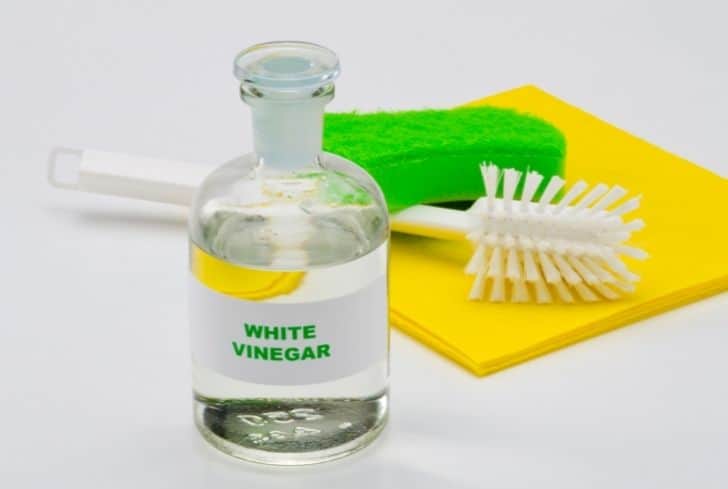There are several items that you are guaranteed to find in almost every kitchen you step into, regardless of status or nation. They include vegetables and fruits, utensils, honey, garlic, cooking oil and of course vinegar. Vinegar comes in different types depending on source materials, but you surely will find it in most kitchens.
Vinegar is used for cooking, cleaning, as well as killing weeds, while some might use it for its purported health benefits. regardless, the centuries-old liquid is a gem in the kitchen. Well, vinegar might also have uses outside the kitchen and could be used in the garden or as compost. This article has more on using vinegar for the garden.
Can Vinegar Go in The Compost?
Yes, vinegar can go in the compost. Vinegar is made from a variety of diluted alcohol products, the most common being wine, beer, and rice. It is an alcoholic liquid that has been allowed to sour and is primarily used to flavor and preserve foods and as an ingredient in salad dressings and marinades.
Being a positive addition to the kitchen, it comes in to uphold the rule of thumb when composting; almost everything edible is compostable. Vinegar is acidic, which could be a bother to some of the worms, fungi and bacteria that help with the composting process.
It also translates that it might make a slightly acidic compost, thereby lowering the pH of your garden’s soil. This is the major reason why most people are afraid of composting vinegar. It also complements the other reason why most prefer to use it directly in the garden rather than in compost; it kills weeds and deters pests.
Vinegar is a natural weed controller because of its acidic nature. It also deters pests and can work wonders in your garden. Apple cider vinegar also contains many valuable nutrients that can benefit the compost pile.
Pickles can also generate vinegar, which is also compostable. Pickles tend to contain a lot of salt which can be harmful to many plants in high concentrates. The general summary from all this is that you should compost vinegar in moderation. If used in large amounts, like with composting garlic, the vinegar will produce too much acid and kill the beneficial bacteria.
Another issue with store-bought pickles is that they may be made with a lot of preservatives that can make them slow to break down in a compost pile. So, whether it is industrial-made vinegar, or that originating from pickles, compost it while exercising a lot of caution.
Is Vinegar Good for Plants?
Vinegar is excellent for plants. It can be used for plants in several ways as illustrated below:
1. As a herbicide
Household vinegar is an all-natural weed killer. It can also kill termites which may affect some plants, as explained below. However, you should be careful when spraying vinegar around certain plants as it may be harmful to some plants.
But when used on those pesky hard-to-kill weeds, they will disappear in a matter of days. To get the job done, simply combine a gallon of white vinegar, one cup of salt, and a couple of tablespoons of dish soap.
2. Cleaning clay pots
Clay and terracotta pots are the ideal pots for growing plants due to their durability and ability to provide cool soil even in extreme heat. They are also notorious for absorbing salt, calcium or other minerals which may leave them covered in unappealing white stains. Just use a cup of vinegar and four cups of water to clean the pots, dissolve the stubborn mineral build-up and leave your plants looking amazing from the pots.
3. Preserving freshly cut flowers
When you cut flowers from the stems, they tend to have a short life span and die off quite easily. Without having roots that can supply essential nutrients to the flowers, they will simply wilt after some days.
You can overcome this by filling a vase with one quart of water, and two tablespoons each of sugar and white vinegar. This will prolong the life of your home-grown bouquets and have your house looking more lively.
4. Helping tough seeds germinate
There are some seeds like the okra and nasturtium that can be difficult to germinate. To make the process a bit easier, soak the stubborn seeds overnight in a bowl of water with a few drops of white vinegar, and plant them the next day as usual and see quicker results.
5. Keep unwanted animals out
There are some animals, good or bad that can invade your garden and cause damage. The raccoon is truly a no for the garden, but then again the cute and fluffy rabbit, cats and dogs might also be a nightmare for your garden.
To keep them from destroying your plants, soak a few items in white vinegar and post them around the garden’s perimeter. Doing this will keep the animals from coming near the garden and your plants.
6. Increasing your soil’s acidity
Vinegar can be fatal to many common plants, while it can be very beneficial to rhododendrons, hydrangeas and gardenias, which thrive in acidic conditions. To increase the oil’s acidity and benefit acid-loving plants, just combine one cup of plain white vinegar with a gallon of water and use it the next time you water these plants to see the amazing results.
You can also add some distilled vinegar to your soil to fight lime or hard water for other not-so-acid-loving plants. However, be very careful not to alter the pH of the soil and affect alkaline-loving plants whose productivity will surely go down.
7. Eliminate slugs and snails
Snails and snags can be really nasty and affect the productivity of some crops like cabbages. To get rid of two of the most notorious garden pests, simply spray them with water and distilled vinegar mixture.
8. Removing unwanted weeds from driveways and sidewalks
Weeds can overgrow absolutely anywhere including areas they should not, like the driveway. To get rid of the weeds, simply spray pure white vinegar on the affected areas.
9. Clean and wash fresh vegetables
Simply combine one tablespoon of distilled white vinegar with a quart of water. Although washing fresh vegetables with running water is sufficient, adding vinegar will ensure that any harmful bacteria is successfully removed.
Can Vinegar Kill Termites?
Of course. Vinegar is the wonder product that you can go for to eliminate all sorts of pests, including termites. The acidity in the vinegar is enough to kill termites on contact.
Just mix up half a cup of vinegar with the juice from two lemons, and you will have gotten your termite killer. Put it in a spray bottle and spray the mixture around the area where you suspect the termites.
Also, be sure to spray regularly to catch any termites that were not eliminated during the last treatment. You should also not forget the self-precaution measures and use chemical-resistant gloves when mixing and applying and for the love of everything holy, do not inhale the vinegar vapors.
Other ways of killing termites using vinegar are to use it in its pure form, dissolve it in water at a 1:1 dilution rate, or using white vinegar with olive oil at a ratio of one part vinegar to four parts olive oil.
The methods involving dilution of vinegar with water and with lemon juice are effective to eliminate the termites that are currently visible. The vinegar solutions will keep other wood-consuming pests away from using the treated areas or mud tubes as well. Lemon in itself contains d-limonene that is a poison to wood pests and kills the termites by destroying their digestive systems.
The mixture of white vinegar and olive oil is a perfect furniture polish and you should apply the mixture with a soft fiber cloth, and the resulting protective layer will keep the termites away.
Depending on how severe the termite infestation is, it could take you up to four weeks to eliminate them. Do not forget to re-treat an infected zone as well as ensure you eliminate the entire colony.
Can Vinegar Expire?
No, vinegar does not expire. Technically, vinegar can have an expiration date printed on the label, although the reality might be a bit different from this. Vinegar is a fermented product, to begin with, and the good news is that it has an “almost indefinite” shelf life.
Because of its acidic nature, vinegar is self-preserving and does not need refrigeration. In fact, white distilled vinegar can remain virtually unchanged over an extended period. although some changes can be observed in other types of vinegar, such as color changes or the development of a haze or sediment, this is only an aesthetic change.
In addition to cloudiness or sediment, vinegar may also develop a slimy substance called a “mother,” which may look and sound scary but is actually harmless. The product will still be used and enjoyed confidently.
In fact, the ‘mother’ can be used to make a new batch of vinegar. So, keep that vinegar bottle in the pantry for another year and even longer. Stop hoarding and start enjoying all different varieties of the product.
Can Vinegar Be Used for Cleaning?
Without a doubt, yes, vinegar is excellent for cleaning. Vinegar is not only used for cooking but also makes for a great cleaner and disinfectant because it is made from acetic acid. Acetic acid is a colorless organic compound that gives vinegar its sour taste and pungent smell and is also an ingredient in some store-bought household cleaners.
The acidic nature of vinegar is so powerful that it can dissolve mineral deposits, dirt, grease, and grime. It is also strong enough to kill bacteria. Of the several types of vinegar, white distilled vinegar is the best vinegar for cleaning. This is because it does not contain a coloring agent and therefore does not stain surfaces.
Distilled white vinegar also has about 5% acidity, which is similar to the acidity level in many everyday multipurpose cleaners. Staining surfaces will happen if you clean using a darker colored vinegar.
Vinegar is, therefore, an effective cleaner when compared to some conventional cleaners. It is also more convenient, given that some cleaners are not exactly healthy or environmentally friendly.
Vinegar is cheaper, non-toxic and eco-friendly, making it the ultimate multipurpose cleaning solution. It is therefore ideal when cleaning glass, countertops, faucets, showers and tubs, toilets, floors, laundry, appliances and the dishwasher. You might have to dilute the vinegar with water when handling some items or surfaces. You can also add salt and baking soda to create a more abrasive cleaner.
Unfortunately, cleaning using vinegar can result in a strong smell which you can mask using a few drops of essential oils such as lavender, lemon or peppermint oils. You can also go old-school and open a window and let some fresh air in to help remove the scent quicker.






